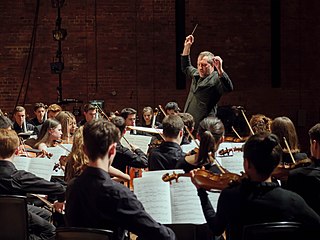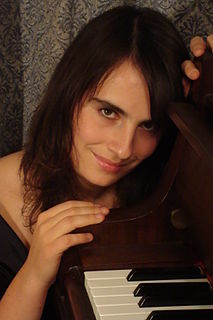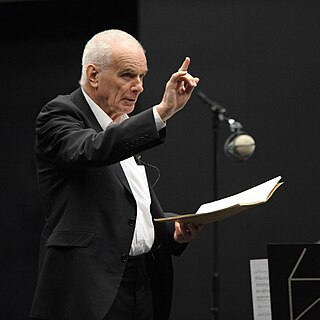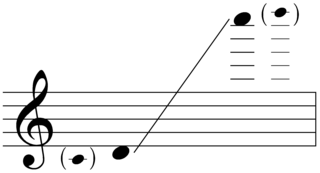Joan Tower is a Grammy-winning contemporary American composer, concert pianist and conductor. Lauded by The New Yorker as "one of the most successful woman composers of all time", her bold and energetic compositions have been performed in concert halls around the world. After gaining recognition for her first orchestral composition, Sequoia (1981), a tone poem which structurally depicts a giant tree from trunk to needles, she has gone on to compose a variety of instrumental works including Fanfare for the Uncommon Woman, which is something of a response to Aaron Copland's Fanfare for the Common Man, the Island Prelude, five string quartets, and an assortment of other tone poems. Tower was pianist and founding member of the Naumburg Award-winning Da Capo Chamber Players, which commissioned and premiered many of her early works, including her widely performed Petroushskates.

Thomas Adès is a British composer, pianist and conductor.
Christopher Chapman Rouse is an American composer. Though he has written for various ensembles, Rouse is primarily known for his orchestral compositions, including a Requiem, eleven concertos, and five symphonies. His work has received numerous accolades, including the Kennedy Center Friedheim Award, the Grammy Award for Best Classical Contemporary Composition, and the Pulitzer Prize for Music. Rouse was the composer-in-residence for the New York Philharmonic from 2012 to 2015.
Stuart MacRae is a Scottish composer.
Jean Rivier was a French composer of classical music.
Alan Feinberg is an American classical pianist. He has premiered over 300 works by such composers as John Adams (composer), Milton Babbitt, John Harbison, Charles Ives, Steve Reich, and Charles Wuorinen, as well as the premiere of Mel Powell's Pulitzer Prize winning Duplicates. He is an experienced performer of both classical and contemporary music and is well known for recitals that pair old and new music.
Gavin Sutherland is a conductor, composer/arranger and pianist. He is currently Music Director for English National Ballet.
Raymond Yiu, born 1973; is a composer, conductor, jazz pianist and music writer.

Alissa Firsova is a Russian-British classical composer, pianist and conductor.
Charlotte Bray is a British composer.

The Symphony No. 2 by Peter Maxwell Davies was commissioned by the Boston Symphony Orchestra in celebration of its centenary, and was composed in 1980. Seiji Ozawa conducted the world premiere with the BSO on 26 February 1981 at Symphony Hall, Boston.

The Symphony No. 3 by Peter Maxwell Davies was composed in 1984 on a commission from the BBC Philharmonic, who gave the world premiere on 19 February 1985, at the Free Trade Hall in Manchester, with Edward Downes conducting.

The Symphony No. 1 by Peter Maxwell Davies was composed between 1973 and 1976, and is dedicated to Sir William Glock, "as a mark of friendship and of appreciation of his work for contemporary music in his years as music controller at the B.B.C.". It was commissioned by the Philharmonia Orchestra, which gave the premiere of the symphony at the Royal Festival Hall, London, on 2 February 1978, with Simon Rattle conducting.
The Third Essay, Op. 47, is a short orchestral work composed by Samuel Barber in 1978. The score is dedicated to Audrey Sheldon.
Graham Whettam was an English post-romantic composer.
Seeing is a concerto for solo piano and orchestra by the American composer Christopher Rouse. The work was commissioned by the New York Philharmonic for the pianist Emanuel Ax, with financial contributions from philanthropists Lillian and Maurice Barbash. It was premiered at Avery Fisher Hall in New York City May 6, 1999, with Leonard Slatkin conducting Emanuel Ax and the New York Philharmonic. The piece is dedicated to Emanuel Ax.
The Piano Concerto is a concerto for solo piano and orchestra in three movements by the Finnish composer Esa-Pekka Salonen. The work was jointly commissioned by the New York Philharmonic, the BBC, the NDR Symphony Orchestra, and Radio France. It was premiered February 1, 2007 in Avery Fisher Hall, New York City, with Salonen conducting the pianist Yefim Bronfman and the New York Philharmonic. Salonen dedicated the piece to Yefim Bronfman.

The Concerto for Trumpet and Orchestra is a composition for trumpet solo and orchestra by the British composer Peter Maxwell Davies. The work was commissioned by the Philharmonia Orchestra for its then principal trumpeter John Wallace. It was given its world premiere by Wallace and the Philharmonia Orchestra under the conductor Giuseppe Sinopoli in Hiroshima on 21 September 1988.
The Piano Concerto is a composition for solo piano and orchestra by the British composer Peter Maxwell Davies. The work was commissioned by the Royal Philharmonic Orchestra and was completed on 24 September 1997. The piece is dedicated to the pianist Kathryn Stott, who premiered the work with the Royal Philharmonic Orchestra under the composer at the Nottingham Royal Concert Hall on 7 November 1997.











